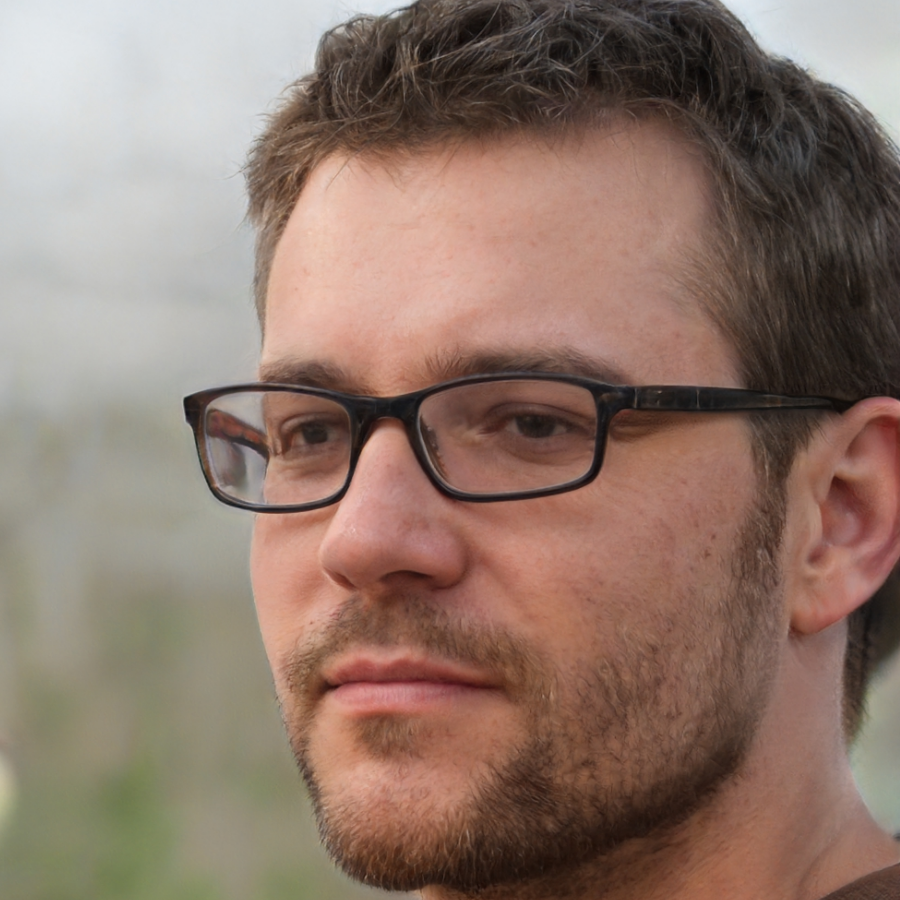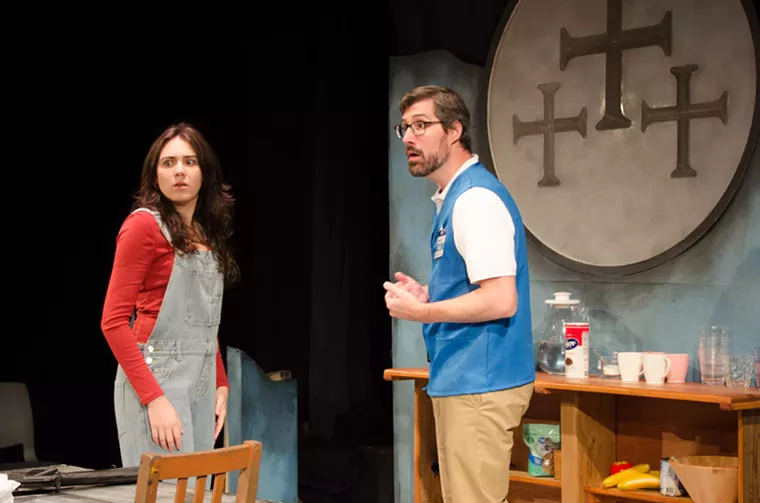Review: The Last Yiddish Speaker at Mildred’s Umbrella and the Evelyn Rubenstein JCC
In a little wooden house in upstate New York, three crosses decorate the wall. They are centrally placed, impossible to ignore, and perfect to obscure the fact that the residents of this little house are, in fact, Jewish.
In Deborah Zoe Laufer’s The Last Yiddish Speaker, the year is 2029, eight years after the successful attack on the U.S. Capital on January 6, 2021. In the years following the insurrection, there have been brutal and concerted efforts to “get rid of the wrong kind of people.” For those left, home inspections are the norm. We learn of a wall that may now exist between the U.S. and Canada, a repopulation mandate, and a recent edict that forbids women from going to college.
Paul and his daughter Sarah, who goes by the name Mary, have fled their New York City home. They are now living in Granville and passing as Christian. Paul, a former city planner, now works at the local Walmart. Sarah is a high school senior, struggling to hide who she is and what she believes amongst the people of her new town and especially in front of her 17-year-old boyfriend John, a Granville local and inspector, tasked with searching Sarah’s home with a gun at his side.
Complicating matters is a mysterious woman who is dropped off at Paul and Sarah’s doorstep, a well-worn suitcase in her hand and a note pinned to her shawl.
“This is your Great Aunt Chava. It’s your turn to hide her. Good luck.”
For Laufer, Chava is a touch of magical realism in her worthy, and sadly necessary, addition to a subgenre of dark and dystopian works, warnings in the form of intellectual exercises in alternate history by folks like Sinclair Lewis and Philip K. Dick. We learn that Chava is 1,000 years old – “give or take” – and traces her own history back to the Crusades. She has since found herself everywhere from Kentucky to Yemen, encountering Nazis, Cossacks, and the Ku Klux Klan. She quite literally gets dropped “wherever something bad is happening to the Jews.”
The Last Yiddish Speaker is aching and funny, and thought-provoking above all else. And this production, from Mildred’s Umbrella in collaboration with the Evelyn Rubenstein Jewish Community Center of Houston, is directed by Rhett Martinez with perfectly paced precision. Martinez navigates the play’s potentially tricky tone with ease, letting us feel the weight of this world and its stakes without overwhelming us.
And whether by necessity or design, Martinez’s traverse staging is quite clever and dynamic. Edgar Guajardo’s set is woody and rustic and perfectly evoking its rural locale, as do Samantha Hyman’s costumes. The set runs from wall to wall, audience members looking on from either side. Guajardo favors bold lighting choices, the color blue particularly prominent, likely for its moody feel and symbolic meaning.
Equally moody and ominous is Guajardo’s sound design. Several sound cues, however, were interestingly abrupt and (if intentional) unnecessarily distracting. And if there’s one thing you wouldn’t want to risk distracting from, it’s the terrific performances from Martinez’s four-actor ensemble.
Deborah Hope is a treasure, so it should be no surprise that she can play a character carrying the weight of an entire culture, its history, and language, on her proverbial back. Hope carries not only that weight, but Chava’s own – centuries of husbands and children long gone – in her hunched-over shoulders and little, shuffling steps, in eyes too knowing and sudden bouts of weakness and breathlessness that suggest she’s not immune to its effects. But most affecting is the way Hope balances “ancient being with a magical charge” with “Great Aunt Chava,” a motherly figure with such warmth, an irresistible twinkle in her eye, and a wicked sense of humor that leads to an incredibly funny exchange between Chava, Sarah, and a translation app.
(It’s worth mentioning, though probably unnecessary, that I’m no expert on Yiddish. But I was thoroughly convinced and impressed, so props to Dr. Mina Graur, the production’s Yiddish consultant.)
As Sarah, Olivia Knight is electric. Sarah is whip-smart and understandably bristling at the restrictions she’s forced to live under. Even when she pushes farther than she should, risking her own life and that of her father, it’s painfully clear why and where she’s coming from. (There’s a particular monologue about a Hawaiian bird that is bound to bring tears to your eyes.) The heart of the play is Sarah’s growing connection with Chava, and Knight’s scenes with Hope are incredibly sweet and tender. Knight also has a great rapport with Jason Duga, who plays Sarah’s father, Paul.
Paul is frustrating by design. He is disconnected from Judaism and motivated by fear, his only real goal (protecting his daughter in the best way he can see) making him a foil to Sarah and, albeit briefly, a threat to Chava. His fear colors his exasperated back-and-forths with Sarah and his ingratiating comments to John and eventually explodes in his outbursts. Duga, however, is excellent at keeping Paul from slipping into one-note territory. Though his desperation may be at the fore, he never lets us lose sight of the internal conflicts that have brought him here.
The fourth member of this ensemble is Austin Brady, who tackles the role of John, Sarah’s small-town boyfriend. John reads as smarmy at the top, with Brady’s approach to him noticeably more performative than his castmates. It may have been to up the suspense on just how sincere John’s love for Sarah would prove to be when push came to shove. Still, Brady excelled in matching Knight’s energy and in portraying John’s growing discomfort as Sarah continually challenged him.
To say that The Last Yiddish Speaker is timely doesn’t quite do it justice, as we’re living in a moment where the timeline could still easily branch off in a direction like the one Laufer envisions in her play. It adds a certain bit of unease, but it’s that tension that tells you just how necessary works like this are and makes it more than worth seeing.
Performances will continue at 7:30 p.m. Thursdays, 8 p.m. Saturdays, and 11 a.m. Sundays through September 21 at the Joe Frank Theatre, Evelyn Rubenstein Jewish Community Center of Houston, 5601 South Braeswood. For more information, call 713-729-3200 or visit mildredsumbrella.com. $18-$29.

Reign Bowers is an outdoor enthusiast, adventure seeker, and storyteller passionate about exploring nature’s wonders. As the creator of SuperheroineLinks.com, Reign shares inspiring stories, practical tips, and expert insights to empower others—especially women—to embrace the great outdoors with confidence.






Post Comment